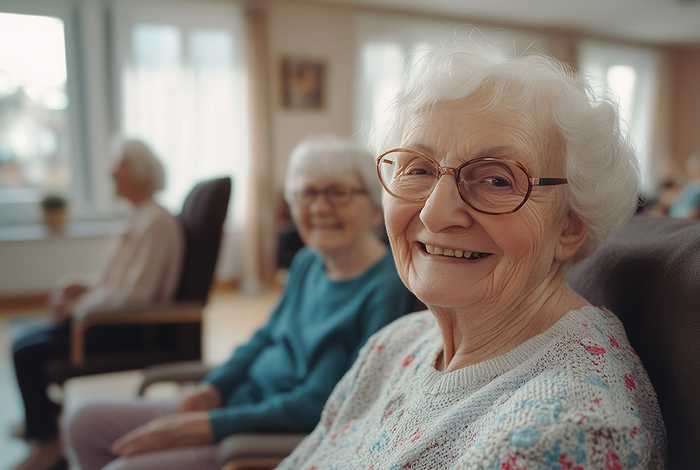Posted by Janine Griffiths
Ultimate guide to caring for your elderly parents at home

Caring for your elderly parents at home is a reality for millions of families across the UK. In fact, research by Age UK, showed that 3.3 million adults aged 40-60 already currently care for or support at least one older parent at home.
While this can be an incredibly rewarding experience, it can also be challenging if you are navigating the complexities of home care for the first time.
Whether it’s managing daily routines, ensuring their health and safety, or simply providing emotional support, there’s much to consider.
In this ultimate guide, we aim to offer practical advice, tips, and resources to help you provide the best care possible. At Autumna, we understand that every family’s situation is unique, and we’re here to support you every step of the way.
Best practice when caring for your elderly parents at home
Caring for your elderly parents at home for the first time can feel overwhelming. With so many things to consider—from managing their health to ensuring their safety—it’s understandable to feel unsure or even confused about where to begin. However, you don’t have to face it alone.
In this section, we’ll walk you through some best practices to help you provide the care your parents need, while also giving you the confidence and support to manage this new chapter with compassion and ease.
Get their needs assessed
A Care Act Assessment is a valuable step in understanding the level of care your loved one needs. By contacting social services at your local authority, you can arrange a care needs assessment that provides a clear picture of your loved one's physical, emotional, and medical requirements.
This assessment is crucial, as it helps identify the support they need, including any assistance with daily tasks, medication, and potential eligibility for financial help. It’s a compassionate way to ensure that you and any other caregivers that you bring in are able to provide them with personalised care. It also means that should you ever need to bring in additional carers, you will at least be aware of whether you are likely to be able to obtain any financial help for that.
Safeguard their environment
Once you have a much more thorough understanding of your parent’s care needs, the next step is to assess whether their current home is suitable.
Consider whether the property they are in needs any adaptations and whether they will be able to continue living safely and independently in their home.
You should also determine whether a personal elderly alarm is needed to improve their safety.
Seniors often need help with household chores and cooking in order to maintain a clean and hygienic environment. Assisting with cleaning, cooking, and laundry can go a long way to helping them to maintain their independence and living environment.
Set a consistent schedule
Creating a consistent and structured routine is key to making sure that any personal care and medical needs they have are provided for them on time.
Establishing a regular sleep and morning routine promotes adequate rest. It's also important to consider the most suitable times for bathing, personal care, and household tasks.
Not only does this provide a degree of predictability and reassurance for your loved one, it also makes it easier for you to plan your schedule around them as well.
Help with bills and admin
It is also a good idea to take note of whether any assistance is needed with managing their finances, bills and other admin tasks. This is especially important if your loved one is experiencing cognitive decline, such as forgetfulness or confusion.
You may need to contact the various organisations that they interact with or gain power of attorney if you think this is necessary.
Food and nutrition
Health and nutrition are among the most important considerations when it comes to caring for your elderly parents at home. It is always best to consult with their doctor or care team where possible in order to ensure they have a nutritious, balanced diet.
They should also be well hydrated and avoid eating a diet high in salt and processed foods. You can either prepare the meals on their behalf or use a meal delivery service for seniors such as Tiptree Meals, Wiltshire Farm Foods or I Care.
Exercise
Regular physical activity is essential for maintaining your elderly parent’s health and wellbeing. Even gentle exercise can help improve mobility, balance, and strength, reducing the risk of falls and promoting independence.
Encouraging activities like light stretching, or seated exercises can also boost their mood and energy levels. Daily walks can also help to improve mobility, with research showing that regular walks have been associated with better balance, improved wellbeing and reduced falls. The findings also show that walking has been associated with improved psychosocial function, a higher quality of life and cognitive development.
Of course, it’s important to tailor exercises to their abilities, so consult with their doctor or a physiotherapist to find the best options. Not only will regular movement benefit their physical health, but it can also help them feel more engaged and positive about life.
Social engagement
Staying socially active is just as important as physical health for elderly parents. Loneliness and isolation can have a significant impact on mental wellbeing, so finding ways to keep them connected is vital.
Whether it’s scheduling regular visits from family and friends, encouraging them to join a local club, or participating in virtual events, social interaction can brighten their day and help them maintain a sense of purpose. Even simple things like a phone call or video chat can make a big difference in their emotional health and overall happiness.
Moving and handling
Helping your elderly parents move around the home can be challenging, especially if they have limited mobility. It’s crucial to use safe moving and handling techniques to avoid injuries for both you and your loved one.
When assisting with transfers, such as from their bed to a chair for example, make sure to use proper body mechanics, or consider using equipment like hoists or grab rails to make the process easier and safer. If in doubt, seek advice from a healthcare professional or occupational therapist who can recommend safe practices and equipment to support their mobility while maintaining their dignity.
How to tell if extra support is needed
If you are feeling stressed, or overwhelmed with your caregiving duties, it is time to ask for help.
Similarly, if you find yourself making too many mistakes or it is negatively affecting your social life, relationships, or personal wellbeing it may be another sign that additional support is needed. Balancing caregiving with your own life is essential, and seeking extra help can provide relief and ensure your loved one gets the best care possible.
Some of your options include temporary respite care, home care, live-in care, or if your parents' care needs are extensive, then it may be time to consider a nursing or care home. The option that is best for your family depends on the extent of their care needs.
What support is available to carers?
Caring for a loved one can be demanding, but thankfully, there are several resources available in the UK to support carers. The first step is to contact your local authority to arrange a Carer’s Assessment, which can help identify your needs and provide access to practical support. This could include respite care, which offers temporary relief for you if you are the primary caregiver or help with household tasks and personal care for your loved one.
Carers may also be eligible for financial support through Carer’s Allowance or other benefits, which can ease some of the financial strain that comes with caregiving. Additionally, many charities and organisations, such as Carers UK and The Carer’s Trust, provide valuable advice, advocacy, and emotional support through helplines, support groups, and online communities.
It’s important to remember that as a carer, you don’t have to face these challenges alone. There are numerous services available to help you manage your responsibilities while maintaining your own health and wellbeing.
Where to go if you need extra support?
If your caregiving duties ever do become overwhelming and you find yourself thinking about enlisting the help of a care provider, then Autumna can help you find the right resources.
All you have to do is head over to our search directory, select the type of care you need and type in your location. You will then be able to view a list of care providers in your chosen area.
You can also use our Shortlist Tool and answer a few questions in order to view a more personalised list of care providers. Alternatively, you can speak to our friendly and knowledgeable team of advisors on 01892 335 330 that can provide you with further assistance.
Receive a Free Home Care Shortlist!
Let our expert team of advisers get your search off to a great start.
Tell us a little about your needs and we'll send you a bespoke shortlist of home care providers! Click the button below to begin, it takes just a few minutes.
Other articles to read
From the blog

Older Persons Care Advice
Ultimate guide to care homes in Norwich
April 23rd, 2025
Discover the best care homes in Norwich—explore lifestyle-focused options, top-rated services, and how to choose the right home with confidence.

Older Persons Care Advice
How to find an adult day care centre near you
April 22nd, 2025
Looking for an adult day care centre near you? Discover how to find safe, joyful care for your loved one—and support for yourself—on Autumna.

Older Persons Care Advice
How to shortlist care homes in Exeter
April 17th, 2025
Need help shortlisting care homes in Exeter? Learn how to filter options with confidence, compare homes, and find the best fit with Autumna’s free tools.
Frequently Asked Questions
A Care Act Assessment is conducted by your local authority to identify your loved one’s physical, emotional, and medical needs. It helps determine the type of support they require, including assistance with daily tasks, medication, and eligibility for financial support. This assessment ensures that your loved one receives the appropriate care based on their specific needs.
You’ll need to think about various aspects, including their health, safety, daily routines, and emotional wellbeing. Creating a consistent schedule, safeguarding their home environment, encouraging social engagement, and ensuring proper nutrition are all important factors to consider when providing care at home.
If caregiving duties are causing you stress, impacting your social life, or becoming overwhelming, it may be time to seek additional support. Whether it’s through respite care, home care services, or live-in care, extra help can relieve the burden and ensure your loved one receives the best care possible.
Carers may be eligible for financial assistance through Carer’s Allowance and other benefits. You can also access practical support through a Carer’s Assessment provided by your local authority, which can help with tasks such as respite care and household assistance.






